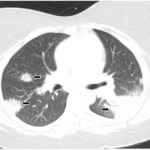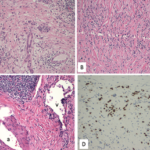The baseline evaluation in suspected sarcoidosis cases should include a complete history with an emphasis on occupational and environmental exposure, a physical exam, blood tests, chest X-ray, spirometry test, electrocardiogram, an ophthalmologic exam and a purified protein derivative test to screen for tuberculosis.
Pulmonary manifestations can include dyspnea, a cough that’s usually dry, chest pain, wheezing or no symptoms at all. Asthmatic symptoms are common, Dr. Highland said.
Sarcoidosis skin involvement can include specific manifestations like maculopapules, subcutaneous nodules, infiltrations of scars and lupus pernio, or non-specific conditions such as erythema nodosum, erythema multiforme and rash, she said.
Manifestations of neurosarcoidosis include CNS masses, aseptic meningitis, encephalopathy, seizures, peripheral neuropathy and myopathy.
Cardiac sarcoidosis is a serious form because it “can result in sudden death,” Dr. Highland said. It can take the form of conduction disturbances, ventricular arrhythmia, congestive heart failure, valvular dysfunction, pericarditis and other issues. Survival with cardiac sarcoidosis largely depends on whether a patient has a preserved ejection fraction, she said.
Treatment
It’s important to remember, she said, that “not every patient needs to be treated.”
“If they’re doing fine [and] they’re relatively asymptomatic, remission is likely with only a small minority having relapses,” Dr. Highland said. “Whereas if they have organ dysfunction, they’re more likely to have evidence of persistence or relapses.” And two-thirds of patients have a spontaneous remission “whether we do anything or not.”
Clues that should cause clinicians to suspect sarcoidosis include African-American race, female gender, symmetric bilateral hilar adenopathy & an asymptomatic presentation.
Corticosteroids are the first-line treatment choice, followed by immune modulators among those with an inadequate response.2 Infliximab is the only medication that has been proved effective in a double-blind randomized controlled trial, Dr. Highland noted.3
Treatment should probably be started right away, she said, in cases of an active neuromuscular or cardiac disease, hepatosplenic involvement with symptoms, significant hypercalcemia, ophthalmic disease that doesn’t respond to topical steroids and disfiguring dermatologic disease, such as lupus pernio.
Thomas R. Collins is a medical writer based in Florida.
Second Chance
If you missed this session, it’s not too late. Catch it on SessionSelect.
References
- Rossman MD, Thompson B, Frederick M, et al. HLA-DRB1*1101: A significant risk factor for sarcoidosis in blacks and whites. Am J Hum Genet. 2003 Oct;73(4):720–735.
- Gibson GJ, Prescott RJ, Muers MF, et al. British Thoracic Society Sarcoidosis study: Effects of long term corticosteroid treatment. Thorax. 1996 Mar;51(3):238–247.
- Baughman RP, Costabel U, du Bois RM. Treatment of sarcoidosis. Clin Chest Med. 2008 Sep;29(3):533–548.


